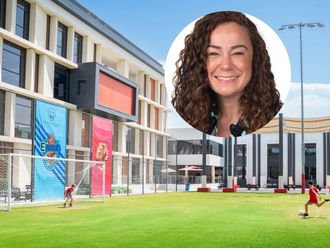
Among the many innovative features at the world’s smartest concert space — Dubai Opera — are seats that automatically fold away, turning the place from a theatre to a flat floor that can be used as a banquet hall. But that’s not the only neat trick available a touchscreen tap away — when the seats change, so does the cooling logic.
Siemens, the company behind the technology, claims the air-conditioning system dynamically adapts, delivering optimum guest comfort and energy savings of up to 40 per cent. Koen Bogers, Senior EVP, Building Technologies Division, Siemens Middle East, explains that cooling is responsible for around 70 per cent of the GCC’s electricity demand during peak summer months, and digital technologies offer huge potential to reduce the energy required for cooling.
Changho Lee, General Manager, LG Electronics Gulf, believes with the world becoming increasingly conscious about global warming, ACs that are not only energy efficient but also utilise the latest technology will be most in demand. He notes that air conditioning has already come a long way.
“While early air conditioners were loud, lacked efficiency, and were expensive to operate, modern AC manufacturers have made great strides to implement cooling technology that is both efficient and convenient, providing consumers with seemingly endless choices.”
Inverter tech is hot
Control units, too, have gotten smarter and contextually aware, capable of intelligently adapting to prevailing conditions in a room.
Lee feels the latest game changer is inverter technology, which can significantly reduce energy consumption and electricity bills. Arun Damodar — Product Manager, Commercial Air Conditioners at Panasonic Marketing Middle East and Africa (Mea), is also betting big on this tech. “Electricity tariffs are rising in GCC countries and manufacturers are striving to offer more energy efficient air conditioners. With stricter energy-efficiency regulations being implemented, energy-saving variable speed compressor AC systems are rapidly gaining popularity.”
Moreover, the latest air conditioners do a lot more than just cool or heat homes and offices — Lee says they also promote healthy living with their advanced air purifying technologies. Ali Al Zein, Head of System AC Division at Samsung Gulf Electronics, concurs. He believes awareness about indoor air quality has gone up significantly in the region. “In the Middle East, we typically spend a much larger portion of our time indoors, particularly during the summer months, and as such the requirement is that HVAC units address the air quality quotient, in addition to temperature regulation requirements.”
On the efficiency front, Zein is enthusiastic about water-based variable refrigerant flow (VRF) technology, which is more efficient than air-cooled VRF and suitable for any type of application. “Already successful in Europe and Asia and now growing in significance in the GCC, VRF technology is now widely accepted in every application, from high-rise residential towers, community villas, school buildings, commercial institutions, warehouses and metro stations.”
Data centre clients
An industry deeply impacted by advances in cooling tech — and usually among the first to try them out — is data centre operations.
A 2017 Cisco white paper observes that cooling is often the limiting factor and if implemented poorly, the power required to cool a data centre can match or exceed the power used to run the IT equipment itself — heat removal can be a bigger problem than getting power to the equipment. Samir Al Hassanin, Director of Mea, DC Cooling Solutions, Schneider Electric, says data centres are experiencing exponential growth in the Middle East, making efficient cooling solutions essential for the smooth functioning and maintenance of the hardware that carries mission-critical enterprise data across industries. “Increasing demand for density cooling and temperature management has paved the way for advanced cooling solutions.”
His list of important advances includes modular designs, free-cooling systems, tandem compressors, touchscreen displays, and enhanced efficiency in energy and space. “Another innovation in air-conditioning technology is adaptability,” adds Al Hassanin.
“Our indirect air economisation can be deployed regardless of most environmental or climatic conditions prevalent in the data centre’s location.”
Greener conditioning
The HVAC industry has a major image problem — air conditioning is perceived as being anything but green. But a combination of new technologies, changing market needs and stringent government regulations is all set to green-ify the industry. Changho Lee insists the industry has been keeping pace with the latest in efficient technologies. He offers the example of inverter tech, where power output corresponds to demand and this smooth adjustment consumes significantly less energy.
Ali Al Zein points out that in the GCC, governments are emphasising high efficiency and safer products to make building construction greener. In addition, regulations such as Estidama and Trakhees are focusing on more efficient products. “A major factor accelerating the market is the growing need to meet individual needs within a building,” he says. “VRF systems have the ability to condition multiple zones in a building, each of which may have different cooling needs.”
Arun Damodar observes that, in addition to energy-saving inverter-based systems, manufacturers are now offering more environment-friendly refrigerants such as R-410A. And over at data centres, Samir Al Hassanin insists that the latest solutions offer savings of more than 60 per cent in energy costs, by combining modularity with a proprietary polymer heat exchanger.
“Technological advances in air conditioning have enabled us to address the challenge of maintaining optimum operating temperatures, while mitigating the carbon footprint.”












